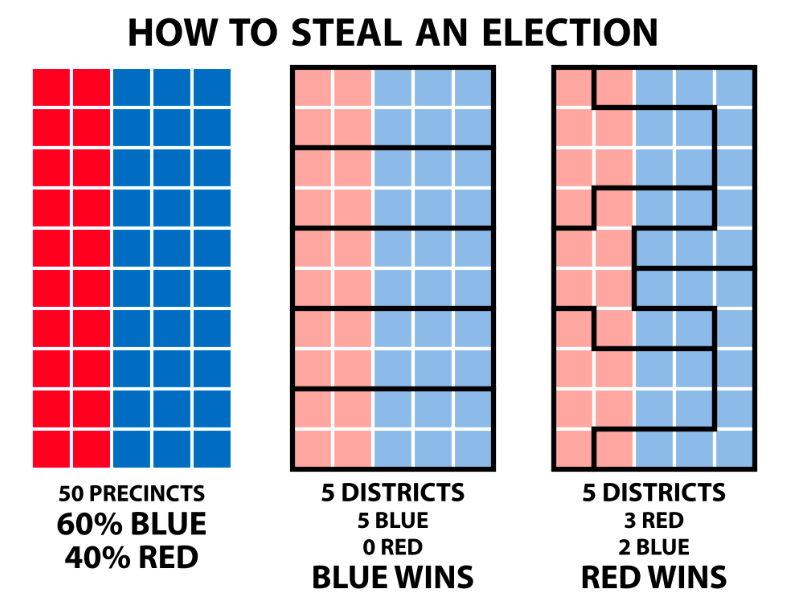I’ve written about contemporary gerrymandering, the effort to tweak our voting rights such that certain people’s opinions matter more than others’.
A preferred strategy to suppress votes is to draw district lines that allow one political party to narrowly elect many representatives, while the other party elects a small number of representatives with overwhelming majorities. When this happens, votes in the landslide victories are “wasted” – those people’s preferred candidate only needed 51% of the vote, after all – which can allow a political minority to retain control.

For example, each congressional district in Michigan represents approximately 700,000 people. In the 14th, a serpentine district designed to suppress the influence of African-Americans by confining their votes to as few districts as possible, candidates can carry 80% of the vote. This congressional vote represents the interests of approximately 560,000 people (700,000 * 0.8).
In other Michigan districts, candidates typically win with 55% of the vote. In these districts, a congressional vote represents the interests of 385,000 people. Their opinions are treated as time-and-a-half more important.
(With the sad corollary being that, in a representative government, the opinions of people who ascribe to minority political philosophies within each district are basically irrelevant. My own congressional representative surely knows that I didn’t vote for him, that I won’t vote for him in the next election, and that there’s only a small chance that anything I say will sway the opinions of people who did vote for him. So he shouldn’t care about my beliefs at all.)
Many people feel that the districting process is crummy. In Michigan, citizens are attempting to wrest control away from professional politicians, but they’re fighting an uphill battle. After all, our country was founded on the principle that some people’s voices opinions do matter more than others’.
That’s why we have a constitutional republic instead of a democracy. In a democracy, the uneducated rabble could undermine the will of the self-styled luminaries who wrote the constitution.
Women couldn’t vote. Black people (“others,” who counted as 60% of a human being when doling representation) couldn’t vote. And although it’s anachronistic to use the term “gerrymandering,” the United States Senate was designed to bloat the voting rights of those intent on dastardly evil.
Almost everyone involved in writing the U.S. constitution believed that rape, murder, torture, and abduction should be permissible (as long as the victims matched certain criteria). But some of the signatories were more enthusiastic about these practices than others, and those individuals worried that the nation’s citizenry might eventually decide that rape, murder, torture and abduction shouldn’t be allowed.
 After all, not everyone held a monetary stake in the nation’s predominant industry. It’s easier to justify torture when we’re making money off it – we still do.
After all, not everyone held a monetary stake in the nation’s predominant industry. It’s easier to justify torture when we’re making money off it – we still do.
So they invented the Senate, a legislative body in which the opinions of people from sparsely-populated southern states would matter more than the opinions of people from densely-populated northern states.
Voting in this country was never meant to be fair. Lo and behold, it still isn’t.
